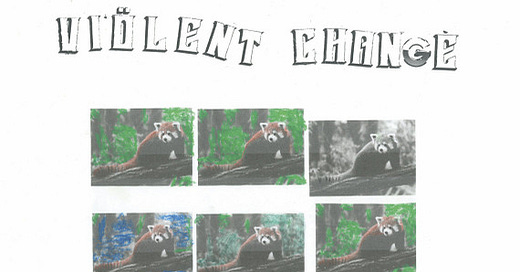11.19.2023
Good morning,
This is Beach Sloth. Below are this week’s albums:
· Editor’s Note – Moving forward, anything that is abnormally loud and noisy beyond what a ‘reasonable person**’ would subject themselves to will be prefaced with a *Volume Warning* Thank you.
*Volume Warning*
Violent Change – Starcastle
Violent Change is the sort of band that watches you from afar, stoned out of their gourd, laughing hysterically at you as you eat a sandwich. Now that you are familiar with the general mindset of weirdness, this is the brown acid of psychedelic rock. The lo-fi is dirty enough even to make Guided by Voices blush. Yes, this is the level of intimacy and general weirdness. Initially starting as an indie-rock and punk outfit, they’ve come a long way down to the roots of San Francisco’s generally dirty, tripped-out vibes.
They’ve been around for over a decade and engage in the same mind-melting attitude that Cindy does so well. Beyond this, they are complete tricksters. I appreciate this tactic, as the songs here seem to begin and end whenever they feel like it. Lots of noise filters into the mix, too, as they have no problem including it in the fray. A genuine love for garage rock comes through with some of these legitimately demented in that Chrome punk/industrial ethos. On the wildest parts of this thing, they conjure up the ancient spirits of Red Krayola’s, the familiar ugly, especially on the intense tribal machine workout of the finale.
Primarily, though, this is fun. They do not care about the album. They do whatever they want; sometimes, that lack of caring makes them stumble upon unexpectedly charming. On “Starcastle” they do whatever they want, whenever they want to. Some of these songs even try to fake out the listener, like the opener, “Mr. Lay,” which might as well be an Elephant 6 single. Then there’s “Sphinx Racket Cascading,” which, besides having an incredibly bizarre title as a song, stumbles about in a raucous mix. Then, following that oddity, they go for “Whipping Boy,” a legitimately catchy piece.
Released on Halloween of this year on perhaps the best label in the universe, “Sloth Mate Productions,” a label that speaks to my heart like no other label could, this is a strange trip. It gets loud and obnoxious, but it’s shockingly a pure joy to behold a group that runs the gamut from delightful pop ditties to obnoxious guitar feedback noise. They display how psychedelic birthed industrial, noise, and that entire ethos.
Kris Gruda – Plays For You
Kris Gruda redefines the blues on “Plays For You.” The sheer amount of love found within these tracks was all recorded during breaks while Kris worked at a Kombucha factory in Western North Carolina. As he puts it in the liner notes
“When music is the passion, one resorts to measures such as picking up the guitar during break times ~ striving to stay in the zone of creativity and joy.”
I appreciate the optimism and playfulness of this statement. The song titles speak for themselves – recorded during an oil change, whenever he has a free moment. We, the listeners, hear random radio snippets of his asides of political and non-political variety and how he speaks to others. No matter the exact circumstance, there is this sense of boundless creativity. Everything here is drenched in love, as he states he first picked up the guitar in the 4th grade and never stopped.
Thirty-four tracks in under 30 minutes means many of these tracks run at a breakneck speed. He mentions the exact guitar he uses, “a ¾ - sized steel string acoustic,” and proves to be quite adept. One could view the short track durations as almost a punk ethos, showing that despite working full-time, he manages to let his art continue living, even thriving. He takes influences from everything from jazz to the blues to sound collages to the avant-garde, never finding one single genre to stay in for too long. Instead, he prefers to keep the listener on their toes, delving deep into his experience. For further context, he mentions how this was recorded during the lockdowns of 2020 and 2021, showing even more resilience for his craft.
The songs are catchy despite their short durations. He has a lot of fun keeping things in the air. Even the sequences feel inspired. A sense of improvisation, like improvising in the middle of a dead period of one’s life, adds to the determination. He embraces this sense of endless possibility, creating art and letting nothing stop him. Speaking of my experience, as an individual who has held multiple jobs simultaneously and never stopped writing, I empathize with everything he is going through, as it sometimes is difficult to get the motivation to keep going.
Bill Orcutt released this on his Palilalia Records label. This is usually set aside for Bill Orcutt’s releases, collaborations, or groups he participated in. Kris changed the style of the label by being the first recording Bill was not directly involved in, though I’m sure the dissonant string-slinging style certainly influenced Kris. I am also happy to see Kris getting more traction for his unique brand of guitar blues, as it feels incredibly modern and, interestingly, a lot more accessible than one would expect. Since he’s been doing this for over a decade, I want his music to continue finding larger audiences. These are clean, catchy pieces, yet that experimental edge allows Kris to sidestep mere nostalgia-digging to deliver something entirely new. It’s a lovely recording that makes you feel like you are in the car with him.
*Volume Warning* - start your volume at “0” and work up from there; no, I am not kidding. You have been warned.
Masonna – Ejaculation Generator
I met a Masonna fan while taking a trip up in Canada. An individual living in Toronto’s metropolitan area listens to this stuff, too. So, when you inevitably wonder, “Who would subject themselves to this,” that’s who. Upon realizing that we both knew and listened to Masonna, we had a moment of silence, knowing never again in our entire lives would we ever meet another Masonna fan in real life. The Masonna fans I know tend to be terminally online, so the likelihood of meeting one in the wild is nil. My chance encounter will remain just that – a chance encounter, never to be repeated.
Of all the Masonna albums he’s released (and he’s released a lot), “Ejaculation Generator” might be his most fully realized work. Is it aggressive? Yes, this is the kind of thing you can listen to only in certain mindsets. If you listen to this every single day, please seek professional help. Typically, all the noise fans I have met in real life, all twelve of them, tend to be very soft-spoken for reasons I cannot properly comprehend. I do not know why the genre forces people to be quieter than they should be; maybe it concerns blasted eardrums—Masonna’s to blame, most likely.
Masonna might also be one of the most obvious links between psychedelic music and noise. The elements of noise related to industrial are essentially non-existent within the sound palette of feedback squall. It makes sense, too – a lot of his work outside of the Masonna moniker places him squarely in the mind-blowingly insane Japanese psychedelic scene from the tastefully named group Flying Testicle to Christine 23 Onna to Bustmonster (the latter of which included Merzbow).
How does this sound, though? This is the sound of absolute and utter madness. First, listening reveals nothing, and that’s by intention. He employs an extensive range of sounds, from amplified screaming to amplified screaming voices. The treatment is what matters, and a few times, he shows off a twisted sense of humor in some of these pieces, as the atmosphere verges on the nearly incomprehensible. Unlike many noise groups that work up to the chaos, he throws you into it and says, “Good luck.”
Most of these songs clock in under one minute, and nothing overstays its welcome. Melodies, nope. Rhythms, interestingly, yes, they do exist, though this may be the result of over-saturation of sound that leads to almost tempos. He has a lot of fun, and the slapstick nature of the noise helps to lighten its sometimes-darker heart. Overall, though, in terms of sheer saturation of noise, it feels like being suffocated, unable to scream above the din.
And again, please play this at reasonable volumes for all those in the back. Start from zero and work up from there. This is ferocious but strangely soothing in the way good noise should be.
Tom Mudd – Guitar Cultures
Tom Mudd’s growing some exemplary Guitar Cultures in his petri dishes. A true digital synthesist (yes, that’s a word, I know, it surprises me too), he’s dabbled in this field before with scraping synths, growing brass cultures, and gutter synthesis. Many know him from the latter, as it was his debut, made when he slept in an Edinburgh gutter after a night of heavy drinking, or, as it is known in Edinburgh, drinking.
What is expressed here, you might wonder. You don’t need to wonder anymore. As a professor, he worked with the Edinburgh acoustics department to capture how physics works within a guitar, most of the time. Sometimes it goes bonkers, and I doubt there is any human who could play “VLOF” as that piece is mind-melting; think Florian Hecker remixing a classic blues musician before turning the tempo up to 8,000 bpm until it becomes a glitching drone.
Other times, he plays it more grounded within reality. The opener, “Romantic Chord, The Brook and The Pool,” feels like a long-lost Gastr del Sol outtake, at least at first. Even the inclusion of the decay of the chords nicely mirrors the highly idiosyncratic playing of David Grubbs, all angular while simultaneously beautiful. The cryptic track title, too, lends itself well to the incredibly otherworldly titles that Gastr del Sol used regularly.
Some other tracks combine the two, not trying to replicate the purely digital or organic side. Instead, there’d be a finger-picking part that would feel natural, immediately interrupted by the digital synthesis losing its complete mind. He usually opts for this middle ground, letting the attempts at the real coincide with the artificiality of the exercise. Those are some exciting moments, too, as it becomes impossible to figure when the algorithm got to be so fucked up, passing out, perhaps doing some of the guttural synthesis that Tom Mudd is oh-so-familiar with.
Maȟpíya Lúta – Wowahwala
Maȟpíya Lúta delivers the rawest black metal on the epic, raging, and expansive degree of “Wowahwala.” They know how to craft some incredible riffs here, going for a deep-set style that feels gigantic. With only a few elements, they create things that suggest the infinite, the endless beyond, into something quite potent. An excellent show of dynamics is on display, too, for it is not all wall of sound; they also feature the right amount of cinematic flourishes in the quieter moments, proving they have the swath of material necessary to pull it off. Since they have a slight ethos for the trickster, the sudden bursts into high-intensity volume are welcome, even satisfying, as some softer moments possess their unique form of tension.
The band’s name means “Red Cloud” in the Lakota language, and the band is Lakotan. Oglala Lakota chief Red Cloud features prominently in the band, right down to the cover art. A sense of sadness permeates some of the sound, too, as Red Cloud was one of the most successful resisters of encroachment into the Western United States by the US Army. He even managed to defeat the United States during Red Cloud’s War. One of the most photographed Native Americans in the 19th century, with 128 photos existing of him, he died stating, “They made us many promises, more than I can remember. But they kept but one – They promised to take our land…and they took it.”
So, successful resistance is an inherent part of the album’s DNA. They display this excellently with tortured yelps and some refined songcraft. While this is very clearly black metal, lo-fi, and all, they have a fantastic understanding of letting each of the three tracks evolve in this living, breathing fashion. Best of all, the patience pays off, allowing things to grow organically, as the opener, “Wancantognaka,” celebrates community, with some tender moments reflecting on the word’s meaning – generosity of heart, comfort, and support.
For me, the highlight comes from the incredible title track and finale, the fifteen-minute plus “Wowahwala” – walk quietly, slowly, humble. The first third of the track is near silence, with the hushed tones emphasizing humility. I got a bit of a jump scare at 4:44, so FYI, here’s a warning: They blast off at that point. You can view the track as a series of thirds: the middle part, which is the most brutal on the senses, and the rest, the build-up/breakdown. Unlike the formulaic crescendo aspects many groups adhere to, this growth, explosion, and return are soothing even in their noisiest bits.
With a careful, considered approach to songwriting, they present a rougher yet nonetheless majestic viewpoint on the genre, going for something timeless, intimate, and natural.
*Volume Warning*
Tyhjä Pää - Prolonged Troubles In Concentration And Memory
Are you all okay, Finland? According to a clickbait article, you’re supposed to be the happiest country in the world. Yet, there’s a remarkable amount of disgusting, filthy noises from your winter wonderland. One vile, harsh, unrelenting act is Tyhjä Pää, which translates into English as “Empty Head.” I like the sheer grossness of this recording; it feels so raw, unhinged, brutal, and a nice little slice of hell.
The songs race by. He manages to create a rather compelling torture chamber of various noises. Sometimes, you can hear vocals attempting to break through the din, though they work more as another textural element. You can’t decipher anything from them as they go for this maximum distortion. He has all the bases covered in high-end, low-end, and mid-range, which gives it a nice, practical stance. He is thorough. Plus, there’s a ton of movement – no harsh wall noise here; it is quite brisk in how he develops these nightmare-inducing fugues.
Throughout the procession, you hear traces of what sounds like a hotel room getting smashed up. Broken glass is a recurring theme (thanks to the Haters, shoutout to GX Jupitter-Larsen!), and the spirit is incredibly liberating, even by noise standards. The sound feels old, and the lack of emphasis on the digital further helps the songs along, as a few of them, when they do calm down, allow for a deeper look at his process. It’s an unusual stance that makes “Shrapnell Garden” a highlight. Here, he divides the listener’s attention between field recordings of brokenness (I assume breaking glass, but your guess is as good as mine) interspersed with very harsh drone work, whose staccato presence adds to the sense of dread. I enjoyed this piece a lot; the lo-fi nature, the field recording mixed with noise, and allowing both enough time to breathe are rare and honestly quite memorable.
Released on the relatively new Satatuhatta label (founded in 2020), this is a real treat for those who want something perhaps a little off the beaten path regarding noise. It is a compelling album with good progression, thoughtful dynamics, and a general sense of rage.
Duster – Remote Echoes
One of the darlings of the slowcore scene, Duster, works best when they take in a general framing device to collect their recordings together. Usually, this is a space-rock effort, some sort of bleary-eyed stance like what a person sounds like when they wake up. This is the main draw, their ultimate charm, and one of the reasons why many of their recordings have this instant “classic” spirit, due to the lo-fi aesthetic and their well-documented fondness for older recording equipment. Since they restarted their efforts to put out new material following the massive retrospective dump of “Capsule Losing Contact,” they’ve been working hard to get a lot of old odds and ends together.
“Remote Echoes” serves as one of those retrospectives, with these songs appearing sporadically throughout their catalog. These are not collected albums like the previously mentioned or a collection of EPs. Instead, these are one-offs, compilation appearances, etc. Due to the way that Duster usually operates, this presents a problem. Many of these are shorter songs and the short songs typically serve as bridges in their album-length releases. When those items are taken out of context and brought together, the experience can be a bit disjointed. Sadly, it is a bit messy for some of the tracks on here. Songs do not flow like Duster, with the transitions lacking the finesse they typically bring. Instead, it results in a somewhat inconsistent ride. Yes, a few of these tracks are good, like the opener, “Before the Veil,” but many are too short, too fleeting, and simply not up to the standards of what they usually put out.
Thus, “Remote Echoes” suffers from this incoherent vision. It is excellent for long-time fans to have all these rarities in one place; still, for casual listeners or those not quite as steeped in Duster’s abnormally expansive lore for a 90s indie rock band, it feels a bit cold-distant, and the album title perhaps a bit too on the nose for comfort.
Questions, Comments, and Concerns:
Please email me at beachsloths@gmail.com
Want to support me financially?
Cash App (this allows me to buy food, headphones, and assorted clothes so I may dress appropriately in public):
$beachsloths
** Your idea of a reasonable person, music-wise, I am sure, differs from my idea. Still, if you’re already here, you’re already unreasonable by sheer virtue of your attendance, and I thank you for that!
Last.fm










